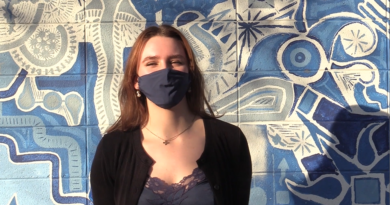Scents at school affecting students
Junior Kelly Chiang opens the door to the bathroom after her second period and is suddenly overwhelmed by a rush of all different kinds of fragrances. At first she jerks away because of the strong smells, but then she slowly peers inside to see a group of sophomore girls spraying perfume all around themselves and the bathroom.
“I was coughing and inhaling all different kinds of scents,” Chiang said. “I even had this headache that bothered me during my next period.”
Although the use of fragrances at school may seem like a trivial matter, it may be affecting students across DHS.
Junior Ben Jin has also felt the effects of fragrances at DHS. “I was walking through that tight hall next to the Old Gym, and I could barely breathe because someone had just sprayed some fragrance all over the place,” Jin said.
The effects of these fragrances are not just confined to the effects seen in Chiang and Jin’s experiences. According to DHS school nurse Rhona Youtsey, “Fragrances can have many adverse effects like nausea, upset stomach, dizziness, watery nose or eyes, and even migraines.”
“There are some businesses banning [perfume use] because the effects can be so bad,” Youtsey added. “Even as a nurse, I was told early on not to wear perfume in the hospital because it could make the patients really sick.”
The adverse effects of strong fragrances are not limited to only students’ physical health. At high schools such as DHS, it may even be affecting academic performance.
“[Students’] attention may be diverted if they are bombarded by smells during class” said Noelle L’Etoile, the Associate Professor of the Center of Neuroscience at UC Davis. Because of the neurological effects of fragrances, students and their grades may be consciously or unconsciously suffering in classes.
Not only do fragrances affect students’ health and academics, they may also affect students’ moods. “The ‘base’ notes of most fine perfumes contain animal bases assumed to
contain pheromones which affect the human mood,” said J.M. Haviland-Jones, professor and director of the Human Emotions Lab at Rutgers University.
Although there are many adverse effects of fragrance use in students, there are positives. According to a study done by Robin Froyberg, the Assistant Professor of Psychology at Yeshiva University, “If the perfume is a pleasant one, it can create increased levels of enjoyment in social activities.” Thus, when interacting with other students such as during group projects, fragrances could improve enjoyment of the social interactions.
“In general, students are getting more sensitive to the effects of all different sorts of fragrances because of the constant exposure to it,” Youtsey concluded.



